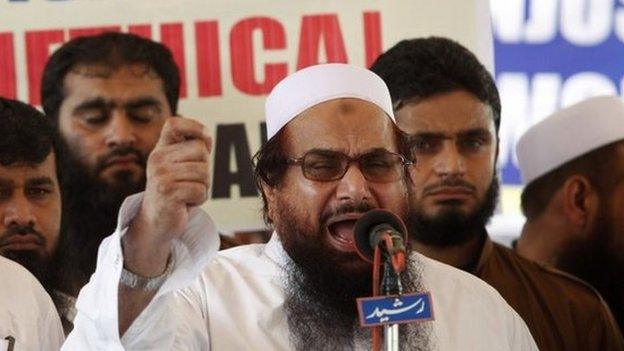Hafiz Saeed: Pakistan's $10m 'bounty man'
- Published
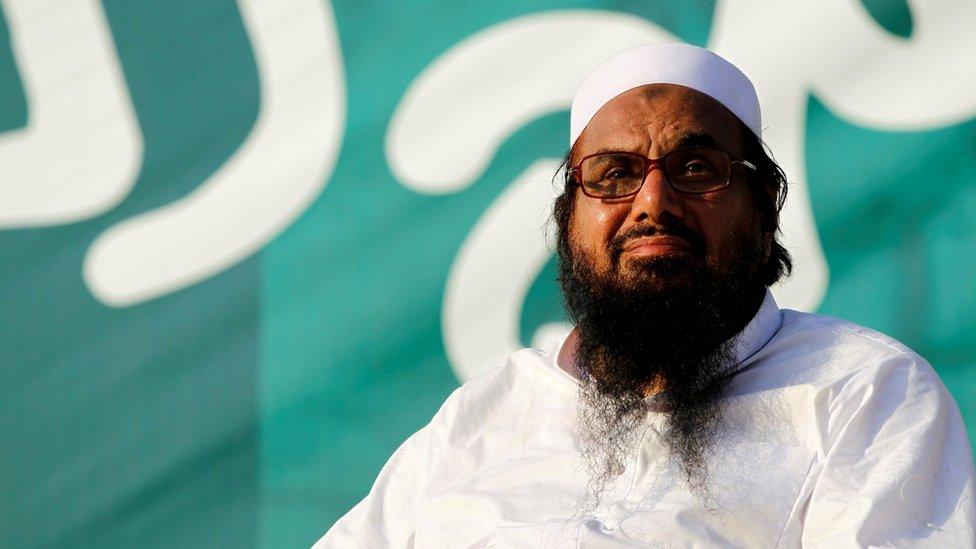
Hafiz Saeed is accused by the US and India of masterminding terror attacks
Hafiz Saeed, the cleric accused by the US and India of masterminding the 2008 Mumbai attacks, is one of Pakistan's best-known hardliners.
He founded the Pakistani-based Lashkar-e-Taiba (LeT) militant group in the 1990s and, when that was banned, revived a much older organisation, Jamaat-ud-Dawa (JuD) in 2002.
Mr Saeed maintains JuD is a Islamic welfare organisation, but the US says it is a front for LeT.
In 2012 Washington announced a $10m (£8m) bounty for information leading to his arrest and conviction but, despite periods of detention over the years, he has remained free.
Now, however, he is under house arrest in Lahore, in a move seen as a response to actions by Donald Trump's White House against nations deemed linked to terrorism.
In a rare interview in 2014, Hafiz Saeed told the BBC he had nothing to do with the Mumbai attacks, calling evidence against him "just propaganda" by India.
"The people of Pakistan know me and they love me. No-one has tried to approach the American authorities to get this bounty. My role is very clear, and God is protecting me."
No charges
Delhi accuses Mr Saeed and his organisation of carrying out several militant attacks on its territory and has been highly critical of the freedom he enjoys in Pakistan.
But to date, Pakistan has maintained there is no evidence to arrest him and put him on trial.
Hafiz Saeed tells the BBC that Washington is unfairly targeting him
He was detained for three months after LeT was accused of carrying out the attack on the Indian parliament, external in 2001. In August 2006, he was detained for activities which the government said were "detrimental" to its relations with other governments, but released in December.
Two years later he was again put under house arrest, this time following the Mumbai attacks , externalof November 2008.
The Pakistani government later acknowledged that "part" of the conspiracy to attack Mumbai did take place on its soil, and that LeT had been involved.
Several arrests were made in Pakistan in connection with the attacks, but no criminal charges were brought against Mr Saeed. He was freed some six months later.
Significantly, these detentions came at a time of mounting international pressure on Pakistan to rein in the LeT.
Military links?
Pakistan's actions against the group as a whole have also been tentative, apparently taken under outside pressure.
It banned LeT in January 2002 after the US put it on its list of terrorist organisations. Likewise, the US placed JuD on a national watch list in December 2008 after the UN imposed sanctions on the controversial charity.
This raised eyebrows in Pakistan, where the links between the militant and social welfare wings of some groups are often not clear.
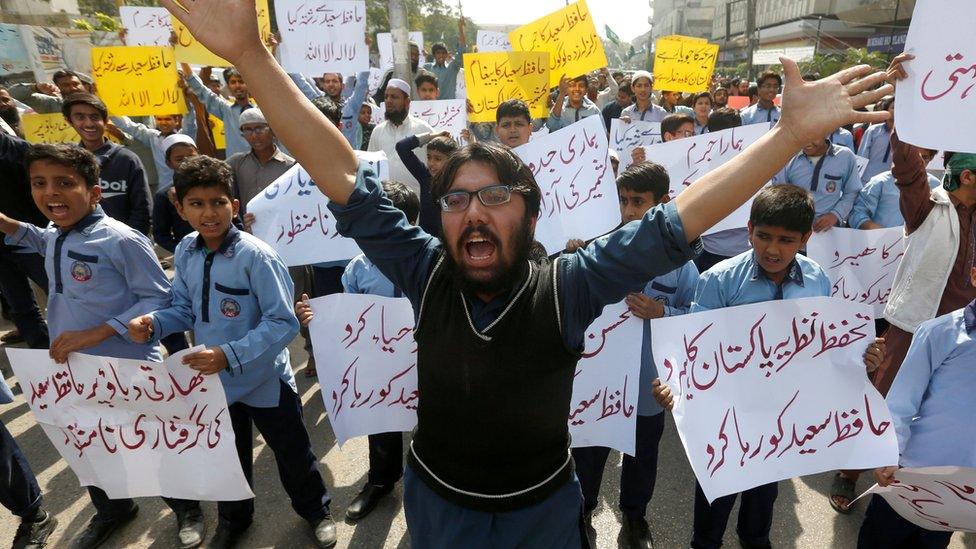
Hafiz Saeed has loyal supporters all over Pakistan
Since 9/11, some organisations banned by the US or Pakistan have continued to operate under different aliases, portraying themselves as welfare rather than militant outfits.
In some cases it appears that the authorities have turned a blind eye and the LeT-turned-JuD would appear to be one such example.
LeT was an offshoot of Jamaat-ud-Dawa wal-Irshad, a preaching, publishing and propaganda network set up by Hafiz Saeed for jihad (holy war) in Afghanistan in 1985.
Abdullah Uzzam, a Palestinian scholar and one of the earliest Arab ideologues of jihad in Afghanistan, was a co-founder.
Mr Saeed formed LeT as the militant wing of Jamaat-ud-Dawa wal-Irshad in the early 1990s, when many militant groups started to move from Afghanistan to Kashmir after the Soviet Union pulled out of Afghanistan.
LeT's rise as a major Pakistani group operating in Kashmir has been widely credited to Mr Saeed's close links to the Pakistani military and intelligence services.
The group also had access to huge funds from Middle Eastern mosques and a countrywide network to raise donations.
Name change
After 9/11 LeT came under increasing international pressure, principally because of its involvement in high-profile attacks in Indian-administered Kashmir and cities in India.
India blamed the group for attacks in Mumbai and Delhi in 2003, 2005 and 2008. It was also named in connection with armed raids on Delhi's Red Fort in December 2000 and on the Indian parliament a year later.
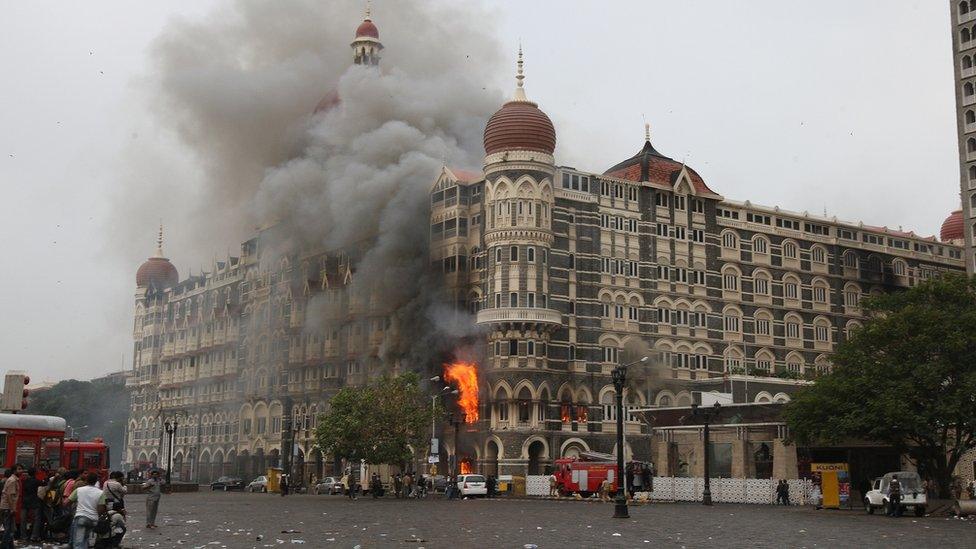
Co-ordinated attacks in Mumbai in 2008 left more than 160 people dead across the city
Days before LeT was banned in January 2002, Hafiz Saeed revived the group's parent organisation, Jamaat-ud-Dawa wal-Irshad, and amended its name.
But there was no significant change in the nature of its activities. JuD offices continued to recruit fighters for militant training camps in Pakistani-administered Kashmir.
The presence of those militants enabled them to start early rescue missions in the aftermath of the earthquake that hit the Kashmir region in October 2005.
That allowed the government to portray JuD as an efficient relief organisation working closely with the Pakistan army as well as UN agencies in quake-hit areas.
Since it was banned, LeT has experienced some defections from its ranks by elements not happy with Pakistan's policy of easing tensions with India.
But independent observers believe the bulk of the organisation has remained united under the clandestine leadership of Hafiz Saeed.
'Orders from Washington'
In 2015, Pakistan placed JuD on its watch list, but stopped short of a ban. Hafiz Saeed is also associated with another charity by the name of Falah-e-Insaniyat (Welfare of Humankind), which is on a US blacklist.
His ongoing freedom has been a major irritant to both Delhi and Washington.
Earlier this month, speaking to JuD activists in Muzaffarabad in Pakistan-administered Kashmir, he indicated that he had inside knowledge of a recent deadly raid on India's military in disputed Kashmir.
He told his audience that jihad was the only way to liberate Kashmir from India, and that it was the religious duty of people in Kashmir and Pakistan to take part.
It is not yet clear how long Pakistan plans to keep him under house arrest, and to what end.
"My detention orders are unlawful and we will challenge them in the court," he told reporters before he was led away by police. "These orders have come from Washington."
Additional reporting by M Ilyas Khan in Islamabad
- Published12 January 2017
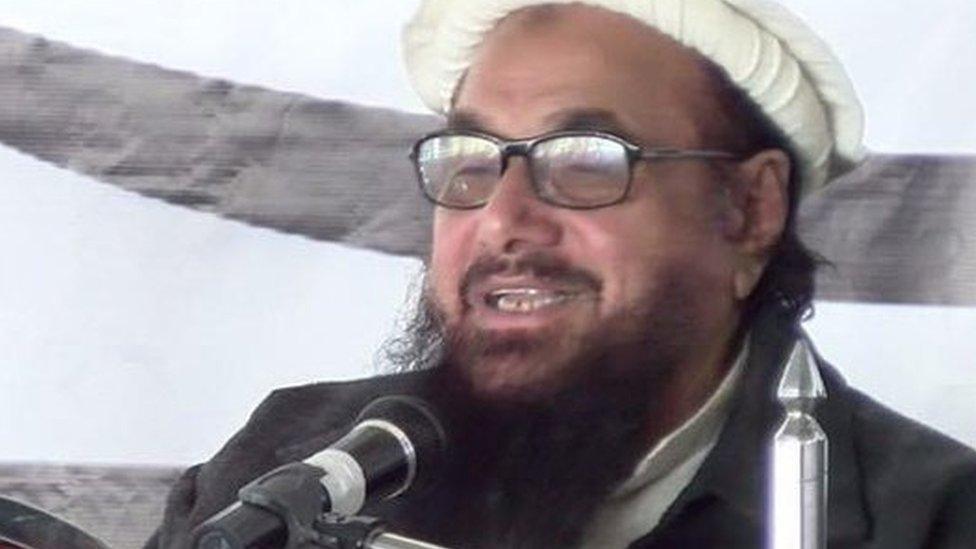
- Published10 April 2015
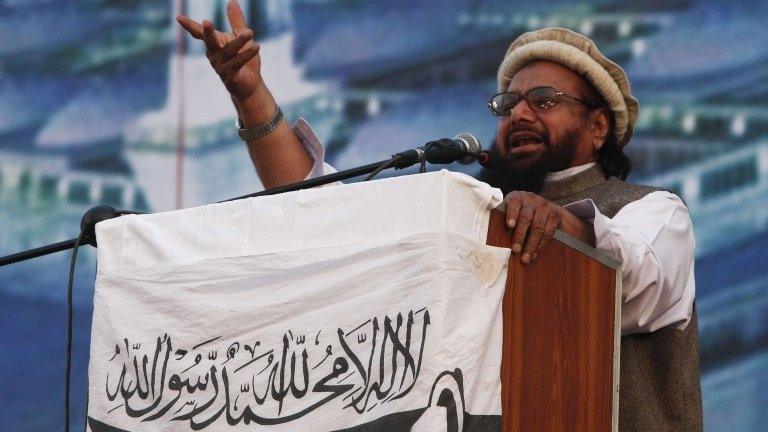
- Published30 June 2014
